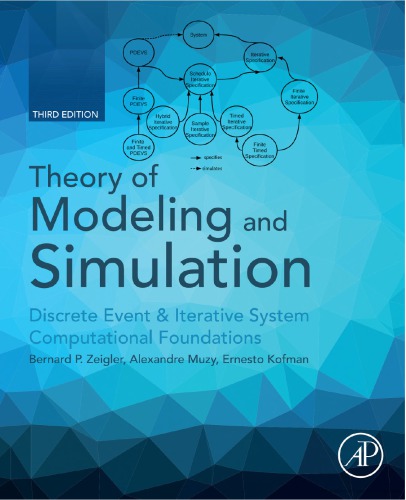


Title: Theory of Modeling and Simulation | Author(s): Bernard P. Zeigler, Alexandre Muzy, Ernesto Kofman | Publisher: Academic Press | Year: 2019 | Language: English | Pages: 674 | ISBN: 978-0-12-813370-5 | Size: 16 MB | Extension: pdf
A consensus on the fundamental status of theory of modeling and simulation is emerging – some recognize
the need for a theoretical foundation for M&S as a science. Such a foundation is necessary
to foster the development of M&S-specific methods and the use of such methods to solve real world
problems faced by practitioners. “[Theory of Modeling and Simulation (1976)] gives a theory for simulation
that is based on general system theory and this theory is considered the only major theory
for simulation. This book showed that simulation has a solid foundation and is not just some ad hoc
way of solving problems.” (Sargent, 2017). “Theory of Modeling and Simulation is a major reference
for modeling formalisms, particularly the Discrete Event Systems Specification (DEVS). ... We mention
the System Entity Structures and Model Base (SES/MB) framework as breakthrough in this field
[Model-base management]. It enables efficiency, reusability and interoperability.” (Durak et al., 2017).
For others there is the acknowledgment that certain of the theory’s basic distinctions such as the
separation, and inter-relation, of models and simulators, are at least alternatives to be considered in
addressing core M&S research challenges. Such challenges, and the opportunities to address them, are
identified in areas including conceptual modeling, computational methods and algorithms for simulation,
fidelity issues and uncertainty in M&S, and model reuse, composition, and adaptation (Fujimoto
et al., 2017).
With the assertion that “an established body of knowledge is one of the pillars of an established
discipline” (Durak et al., 2017), this third edition is dedicated to the inference that theory of M&S is an
essential component, and organizing structure, for such a body of knowledge. A prime emphasis of this
edition is on the central role of iterative specification of systems. The importance of iterative system
specification is that it provides a solid foundation for the computational approach to complex systems
manifested in modeling and simulation. While earlier editions introduced iterative specification as the
common form of specification for unifying continuous and discrete systems, this edition employs it
more fundamentally throughout the book. In addition to the new emphasis, throughout the book there
are updates to earlier material outlining significant enhancements from a broad research community. To
accommodate space for such additions some sections of the last edition have been omitted, not because
of obsolescence – indeed, new editions may re-instate these parts.
This Third Edition coordinates with a second book. “Model Engineering for Simulation” (MES) to
provide both a theoretical and application-oriented account of modeling and simulation. This makes
sense as a coordinated “package”, since most of the background theory material will be contained in
this book and the application to model engineering will be contained in MES. This partitioning into
theory and practice avoids unnecessary redundancy. The books will be published synchronously (or as
closely timed as practical). The editor/leaders of the two books have coordinated closely to assure that
a coherent whole emerges that is attractive to a large segment of the simulation community.
مبلغ قابل پرداخت 30,000 تومان
برچسب های مهم